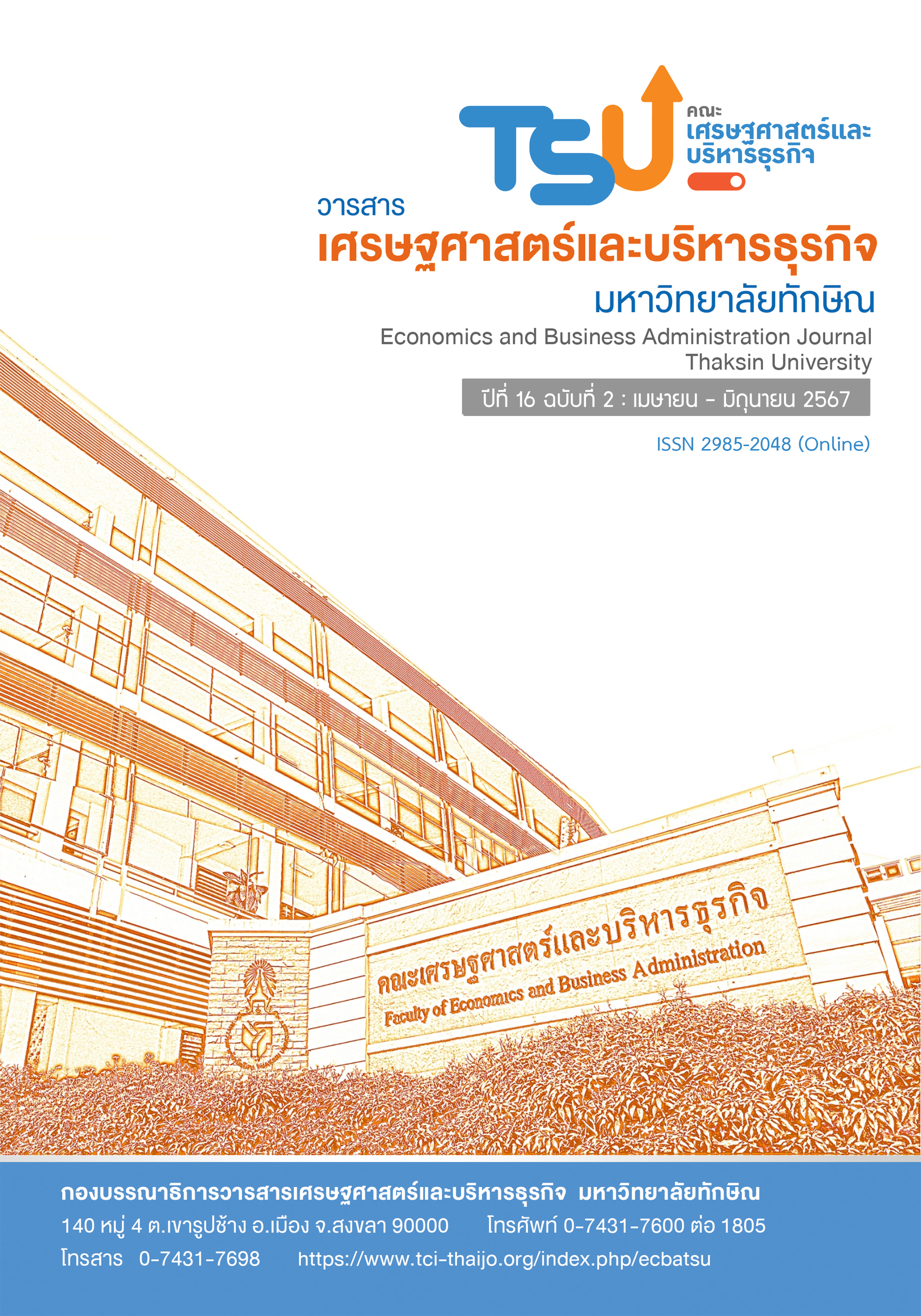Financial Literacy: Determinants and Effects on Over-Indebtedness of Muslim Households in Southern Border Provinces of Thailand
DOI:
https://doi.org/10.55164/ecbajournal.v16i2.265162Keywords:
Financial literacy, over-indebtedness, Southern border provinces of ThailandAbstract
This study is a survey research project aimed at analyzing the financial literacy of households and the impact of financial literacy on over-indebtedness of Muslim households in the southern border provinces of Thailand. The data were collected using a structured questionnaire from a sample of 825 Muslim households. The effects of financial literacy on the over-indebtedness of the households were studied using appropriate descriptive statistics and logistic regression analysis.
The study found that Muslim households in the southern border provinces had moderate financial literacy, while their financial knowledge and financial attitude scores were relatively low. Financial literacy had no significant influence on a household's over-indebtedness behavior, according to the study. However, it found that households' increased financial knowledge and financial attitudes increased their likelihood of over-indebtedness. On the other hand, having better financial behavior will significantly reduce the possibility of over-indebtedness households. It also found that other factors such as age, gender, level of education, and level of income influenced household over-indebtedness. According to the findings, the older the head of the household is and the higher his level of education, the more likely a household is to incur excess indebtedness. Meanwhile, women-headed households and high-income households significantly reduce their households' chances of incurring excessive debt.
The findings suggest that good financial behavior can significantly reduce household over-indebtedness. Therefore, policymakers should take action to promote household financial literacy to an appropriate level that will create financial discipline for households, leading to balanced financial management.
References
Amonhaemanon, D., & Isaramalai, S. (2019). Financial Literacy: What is it and why does it Matter? Nida Business Journal, 25(2019), 51-80.
Atkinson, A., & Messy, F. A. (2012). Measuring Financial Literacy: Results of the OECD.
Bank of Thailand. (2013). The Report of Financial Literacy Survey in Thailand. https://www.1213.or.th/th/aboutfcc/knownfcc/Documents/2013%20ThaiFL Survey.pdf.
Bank of Thailand. (2014). Household Debt and the Southern Economy. Academic Seminar on Southern Economics 2014.
Bank of Thailand. (2016). The Report of Financial Literacy Survey in Thailand. https://www.1213.or.th/th/aboutfcc/knownfcc/Documents/ThaiFLsurvey 59.pdf.
Bank of Thailand. (2018). The Report of Financial Literacy Survey in Thailand. https://www.1213.or.th/th/flsurveyreport/2561ThaiFLsurvey.pdf.
Christelis, D., Jappelli, T., & Padula, M. (2010). Cognitive Abilities and Portfolio Choice. European Economic Review, 54(1), 18-38.
De Bassa Scheresberg, C. (2013). Financial Literacy and Financial Behavior among Young Adults: Evidence and Implications. Numeracy, 6(2), 1-21.
Disney, R., & Gathergood, J. (2013). Financial Literacy and Consumer Credit Portfolios. Journal of Banking & Finance, 37(7), 2246-2254.
Garman, E. T., & Forgue, R. E. (2000). Personal Finance: the Human Resource Manager: Caught in the middle. CUPA Journal, 45(1), 33-35.
Hailpern, S. M., & Visintainer, P. F. (2003). Odds Ratios and Logistic Regression: Further Examples of their use and Interpretation. The Stata Journal, 3(3), 213-225.
Hassan Al-Tamimi, H. A., & Anood Bin Kalli, A. (2009). Financial Literacy and Investment Decisions of UAE Investors. The Journal of Risk Finance, 10(5), 500-516.
Kengchon, C., Mahujchariyawong, P., & Vacharachaisurapol, T. (2015). Mitigating of Financing Constraints in the Thai Banking System. Thammasat Review of Economic and Social Policy, 1, 96-167. https://doi.org/10.14456/tresp.2015.4
Huston, S. J. (2010). Measuring Financial Literacy. Journal of Consumer Affairs, 44(2), 296-316.
Lusardi, A. (2012). Numeracy, Financial Literacy, and Financial Decision-making. National Bureau of Economic Research Working Paper Series, No. 17821.
Lusardi, A., & de Bassa Scheresberg, C. (2013). Financial Literacy and High-Cost Borrowing in the United States. National Bureau of Economic Research Working Paper Series, No. 18969.
Lusardi, A., & Mitchell, O. S. (2011a). Financial Literacy and Planning: Implications for Retirement Wellbeing. National Bureau of Economic Research Working Paper Series, No. 17078.
Lusardi, A., & Mitchell, O. S. (2011b). Financial Literacy Around the World: An Overview. Journal of Pension Economics and Finance, 10(4), 497-508.
Lusardi, A., & Mitchell, O. S. (2014). The Economic Importance of Financial Literacy: Theory and Evidence. Journal of Economic Literature, 52(1), 5-44.
Lusardi, A., & Mitchelli, O. S. (2007). Financial Literacy and Retirement Preparedness: Evidence and Implications for Financial Education. Business Economics, 42(1), 35-44.
Lusardi, A., & Tufano, P. (2015). Debt Literacy, Financial Experiences, and Overindebtedness. Journal of Pension Economics and Finance, 14(4), 332-368.
Lyons, A. C., Grable, J. E., & Zeng, T. (2019). Impacts of Financial Literacy on the Loan Decisions of Financially Excluded Households in the People’s Republic of China. ADBI Working Paper 923. Asian Development Bank Institute.
Organization for Economic Co-Operation and Development (OECD). (2005). Improving Financial Literacy: Analysis of Issues and Policies, Paris, France.
Tulayasathien, S., Wongchaiwat, P., & Srikhum, P. (2015). The Development of a Micro-simulation Model to Study the Role of Household Debt on Income Distribution Inequality in Thailand. Fiscal Policy Office, Ministry of Finance.
Van Rooij, M., Lusardi, A., & Alessie, R. (2011). Financial Literacy and Stock Market Participation. Journal of Financial Economics, 101(2), 449-472.
Wiboonpongse, A. (2006). Applied Econometrics for Agricultural Marketing (2nd ed.). Faculty of Agriculture, Chiang Mai University.
Downloads
Published
How to Cite
Issue
Section
License
Copyright (c) 2024 Faculty of Economics and Business Administration, Thaksin University

This work is licensed under a Creative Commons Attribution-NonCommercial-NoDerivatives 4.0 International License.




